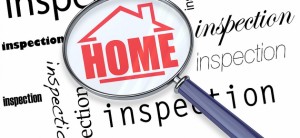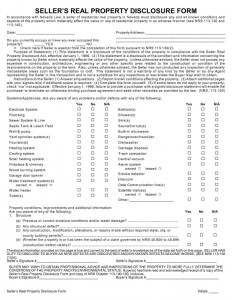The Pre-Listing Home Inspection
I’m willing to bet that the reason not many real estate agents advise their clients to consider having a pre-listing home inspection performed is because they are not fully aware of the benefits this service provides. If I may I’d like to outline the benefits a pre-listing home inspection provides and how the process works (or should work) with both the home inspection company and for the seller.
Benefits of a Pre-Listing Home Inspection
The number one benefit afforded by a pre-listing home inspection is that it demonstrates an advanced level of disclosure by the seller and is the number one best way to limit liability for anything structural or mechanical relating to the home.
A pre-listing home inspection is an attractive selling feature for marketing the home. It demonstrates to prospective buyers that the seller is being forthright and transparent and is an indicator of the tone of the potential transaction.
Another benefit is that it can significantly reduce the amount of expense the seller could incur as a result of the buyers home inspection and reduce the cost of selling the home. (We will go into detail on this below).
A pre-listing home inspection will reduce the potential for issues that may arise from the buyer’s home inspection that could derail the sale or, at the very least, add complications to the sale of the home.
 The Process
The Process
A pre-listing home inspection is a two-part process. At the initial inspection the intent is for the inspector to provide an in-depth inspection and get as “nit-picky” as possible. The goal here is to identify each and every item a buyer’s inspector might find. The inspection should exceed the scope delineated by NAC 645D.460-580, the minimum scope allowed by law.
Once the report is compiled the seller reviews the report and they make a decision on which issues they would want to address or correct. Typically the seller would want to correct any significant issues that may influence the buyer’s decision to purchase. Also typically the seller would want to correct any potential habitability and safety issues to prevent them from becoming appraisal or underwriter conditions during the purchase process. Correcting any safety issues will significantly reduce potential liability.
Missing straps on a water heater is a very common appraisal “safety” issue that has impacted many home sales and becomes an appraisal condition. When they become an appraisal condition then funding of the buyers loan will not occur until the straps are installed. This often can cost the seller money because the appraiser needs to be paid to come back out and verify their installation.
Once the issues have been corrected the home inspector returns to the property to verify the repairs were properly accomplished. The inspector then provides the seller with an addendum to the report outlining and documenting the repairs.
Advanced Disclosure
Once the pre-listing inspection is accomplished, repairs (if any) are performed, and the Repair Review report has been issued the Seller provides all the documentation as an addendum to the SRPD (Sellers Real Property Disclosure).
issued the Seller provides all the documentation as an addendum to the SRPD (Sellers Real Property Disclosure).
The SRPD and accompanying addendum(s) should be provided to the buyer simultaneously with the accepted offer to purchase (or very soon thereafter). The Purchase Agreement should be very clear that the Buyer’s inspection cannot take place until the SRPD is reviewed and approved.
Buyer’s home inspection? Absolutely! Be very clear that the Buyer should be encouraged to have their own home inspection performed. There are several reasons for this. Most Buyers are reluctant to rely on “the Seller’s inspector”. Many prospective Buyer’s, in their exercise of due diligence and an abundance of caution, are wont to believe the that the Seller’s pre-listing inspection is entirely accurate.
But the most important reason that a prospective Buyer should have their own inspection performed is because Buyers would also lose any recourse by relying solely upon the Seller’s pre-listing home inspection. The reason they would have no recourse is because they are not the client for whom the inspection was performed. The seller is the client of the company who performs the pre-listing home inspection.
Generally not all the items identified in the pre-listing home inspection will be corrected by the seller. There are generally deferred preventative maintenance issues and appearance issues that exist in any home. As we all know many home inspectors will often include issues that are not significant structural or mechanical issues and repair requests can be filled with frivolous items. When the Buyer’s inspector identifies any of these issues and the Buyer submits a request to have these same issues corrected the seller can point to the SRPD and that the issues were already disclosed and accepted. This can potentially save the seller money, time, effort, and energy.
Our Expertise in Pre-Listing Home Inspections
One of the challenges we typically encounter on our Resale Home Inspections is restraining ourselves from providing a depth inconsistent with the purpose of the inspection. A resale home inspection, that is -an inspection on a home that is or has previously been occupied, appearance and cosmetic issues are not appropriate to be commented upon. But we have a great amount of experience on new construction home inspections where cosmetic and appearance issues that do not conform to minimum construction standards are stated and disclosed.
a depth inconsistent with the purpose of the inspection. A resale home inspection, that is -an inspection on a home that is or has previously been occupied, appearance and cosmetic issues are not appropriate to be commented upon. But we have a great amount of experience on new construction home inspections where cosmetic and appearance issues that do not conform to minimum construction standards are stated and disclosed.
In our pre-listing home inspections we have a hall pass to be very nit-picky and we will call out deferred preventive maintenance issues as well as many appearance and cosmetic issues. Examples of this include issues such as: the carpet needing cleaning; deteriorated caulking in bathrooms and kitchens needed to be renewed; burned out light bulbs; missing door stops; deteriorated pipe insulation on air conditioner lines; etcetera.
It needs to be very clear that one of the limitations in our pre-listing home inspection is that we will not provide referrals to specific contractors for any issues identified in our inspection reports. Offering referrals could provide the appearance of an impropriety. If we called out roofing issues on every inspection we could have a brother-in-law in the roofing business who would happily provide a referral fee for each job we provided. In accordance with the ethical standards we maintain for ourselves we believe the appearance of a potential impropriety IS an impropriety. We will not provide referrals to any specific contractors because we avoid entering any ethical gray areas.
 We will provide sellers with guidance and direction to find the appropriate contractor from the Better Business Bureau of Southern Nevada. We further recommend that any and all contractors have their licensing status verified with the Nevada State Contractors Board.
We will provide sellers with guidance and direction to find the appropriate contractor from the Better Business Bureau of Southern Nevada. We further recommend that any and all contractors have their licensing status verified with the Nevada State Contractors Board.


